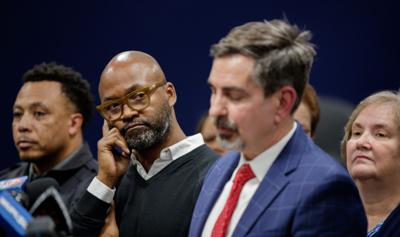A judge on Monday denied a request from defense attorneys to force Louisiana prison officials to prove they can constitutionally hold the three teenage girls who were convicted as adults in last year’s carjacking and killing of Linda Frickey in Mid-City.
Briniyah Baker, 17, Mar'Qel Curtis, 16, and Lenyra Theophile, 16 were charged as adults with second-degree murder in the death of 73-year-old Frickey, who was dragged to her death. After each of them pleaded guilty to manslaughter last month and accepted a 20-year prison sentence, their attorneys asked to suspend their transfer to the Louisiana Correctional Institute for Women (LCIW) in Baker, arguing the adult facility was unfit to house and educate juveniles.
They asked Orleans Parish Criminal District Judge Kimya Holmes instead to force the Louisiana Department of Corrections to show at a hearing on Monday how it would constitutionally execute the girls’ sentences.
An attorney for Theophile, the youngest of the girls, also asked Holmes to order that his client be held in the juvenile facility until her 18th birthday, citing ongoing mental-health concerns.
Following testimony from Kristen Thomas, warden of the LCIW, Holmes denied both requests.
“I’m satisfied that, as of now, the conditions meet state and constitutional guidelines,” she said.
Then Holmes ordered their transfer from New Orleans juvenile detention, where they have remained since their arrest last year.
In preparation for the teenagers’ arrival, corrections department officials transported 18 women from its Baker facility to the death-row wing of Louisiana State Penitentiary in Angola, a move that sparked controversy as advocates for incarcerated people said the facilities were inadequate for women.
The Baker facility previously served as a segregation unit separating certain prisoners from the general population. Among those moved from the facility to Angola’s prison were former New Orleans Police Department officer Antoinette Frank, the only woman on Louisiana's death row.
Thomas, the warden, testified Monday that the facility where the three teenagers will be held will include an indoor recreational area and access to the outdoors, and that some 50 of its staff had undergone training to properly handle juveniles.
The teenagers would also have access to educational programs, including high-school equivalencies and post-secondary education, she said.
Beth Sgro, an attorney for Curtis, said that denying the girls the opportunity to attend high school — which they have done while incarcerated at the juvenile facility — was illegal.
Theophile's attorney, Gregory Carter, argued that his client's housing at the facility would amount to “solitary confinement” once the older two girls turn 18 and move into the general population. Carter called that scenario “cruel and unusual punishment.”
Assistant District Attorney Matthew Derbes, who led the murder prosecution against the teenagers, said theirattorneys had portrayed the facility as “Count of Monte Cristo-type” accommodations, when instead, they were more than adequate.
Holmes agreed, saying the attorneys could petition the court "if there comes a point where any of the defense attorneys believe the treatment the ladies are receiving” is unconstitutional.


